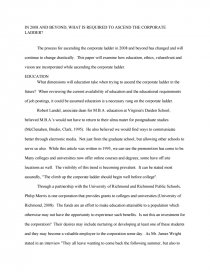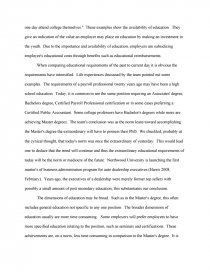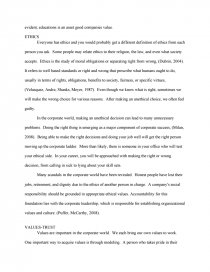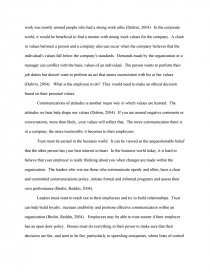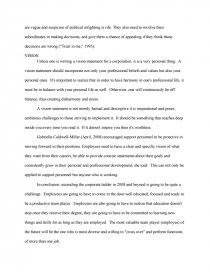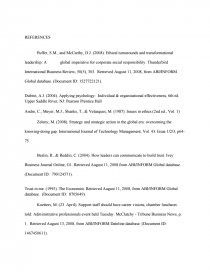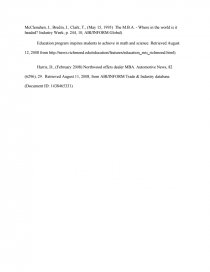In 2008 and Beyond, What Is Required to Ascend the Corporate Ladder?
Essay by Nicolas • September 9, 2011 • Research Paper • 1,896 Words (8 Pages) • 1,980 Views
Essay Preview: In 2008 and Beyond, What Is Required to Ascend the Corporate Ladder?
IN 2008 AND BEYOND, WHAT IS REQUIRED TO ASCEND THE CORPORATE LADDER?
The process for ascending the corporate ladder in 2008 and beyond has changed and will continue to change drastically. This paper will examine how education, ethics, values/trust and vision are incorporated while ascending the corporate ladder.
EDUCATION
What dimensions will education take when trying to ascend the corporate ladder in the future? When reviewing the current availability of education and the educational requirements of job postings, it could be assumed education is a necessary rung on the corporate ladder.
Robert Landel, associate dean for M.B.A. education at Virginia's Darden School, believed M.B.A.'s would not have to return to their alma mater for postgraduate studies (McClenahen, Bredin, Clark, 1995). He also believed we would find ways to communicate better through electronic media. Not just from the graduate school, but allowing other schools to serve us also. While this article was written in 1995, we can see the premonition has come to be. Many colleges and universities now offer online courses and degrees; some have off site locations as well. The visibility of this trend is becoming prevalent. It can be stated most assuredly, "The climb up the corporate ladder should begin well before college".
Through a partnership with the University of Richmond and Richmond Public Schools, Philip Morris is one corporation that provides grants to colleges and universities (University of Richmond, 2008). The funds are an effort to make education attainable to a population which otherwise may not have the opportunity to experience such benefits. Is not this an investment for the corporation? Their desires may include nurturing or developing at least one of these students and they may become a valuable employee to the corporation some day. As Mr. James Wright stated in an interview "They all leave wanting to come back the following summer, but also to one day attend college themselves." These examples show the availability of education. They give an indication of the value an employer may place on education by making an investment in the youth. Due to the importance and availability of education, employers are subsidizing employee's educational costs through benefits such as educational reimbursements.
When comparing educational requirements of the past to current day it is obvious the requirements have intensified. Life experiences discussed by the team pointed out some examples. The requirements of a payroll professional twenty years ago may have been a high school education. Today, it is common to see the same position requiring an Associates' degree, Bachelors degree, Certified Payroll Professional certification or in some cases preferring a Certified Public Accountant. Some college professors have Bachelor's degrees while more are achieving Master degrees. The team's conclusion was as the norm leans toward accomplishing the Master's degree the extraordinary will have to possess their PhD. We chuckled; probably at the cynical thought, that today's norm was once the extraordinary of yesterday. This would lead one to deduce that the trend will continue and thus the extraordinary educational requirements of today will be the norm or mediocre of the future. Northwood University is launching the first master's of business administration program for auto dealership executives (Harris 2008, February). Years ago, the executives of a dealership were merely former top sellers with possibly a small amount of post secondary education; this substantiates our conclusion.
The dimensions of education may be broad. Such as in the Master's degree, this often includes general education not specific to any one position. The broader dimensions of education usually are more time consuming. Some employers will prefer employees to have more specified education relating to the position, such as seminars and certifications. These achievements are, on a norm, less time consuming in comparison to the Master's degree. It is evident, educations is an asset good companies value.
ETHICS
Everyone has ethics and you would probably get a different definition of ethics from each person you ask. Some people may relate ethics to their religion, the law, and even what society accepts. Ethics is the study of moral obligations or separating right from wrong, (Dubrin, 2004). It refers to well based standards or right and wrong that prescribe what humans ought to do, usually in terms of rights, obligations, benefits to society, fairness, or specific virtues, (Velasquez, Andre, Shanks, Meyer, 1987). Even though we know what is right, sometimes we will make the wrong choice for various reasons. After making an unethical choice, we often feel guilty.
In the corporate world, making an unethical decision can lead to many unnecessary problems. Doing the right thing is emerging as a major component of corporate success, (Milan, 2008). Being able to make the right decisions and doing your job well will get the right person moving up the corporate ladder. More than likely, there is someone in your office who will test your ethical side. In your career, you will be approached with making the right or wrong decision, from calling in sick to lying about your skill sets.
Many scandals in the corporate world have been revealed. Honest people have lost their jobs, retirement, and dignity due to the ethics of another person in charge. A company's social responsibility should be grounded in appropriate ethical values. Accountability for this foundation lies with the corporate leadership, which is responsible for establishing organizational values and culture. (Puffer, McCarthy, 2008).
VALUES-TRUST
Values are important in the corporate world. We each bring our own values to work. One important way to acquire values is through modeling. A person who takes pride in their work was mostly
...
...
